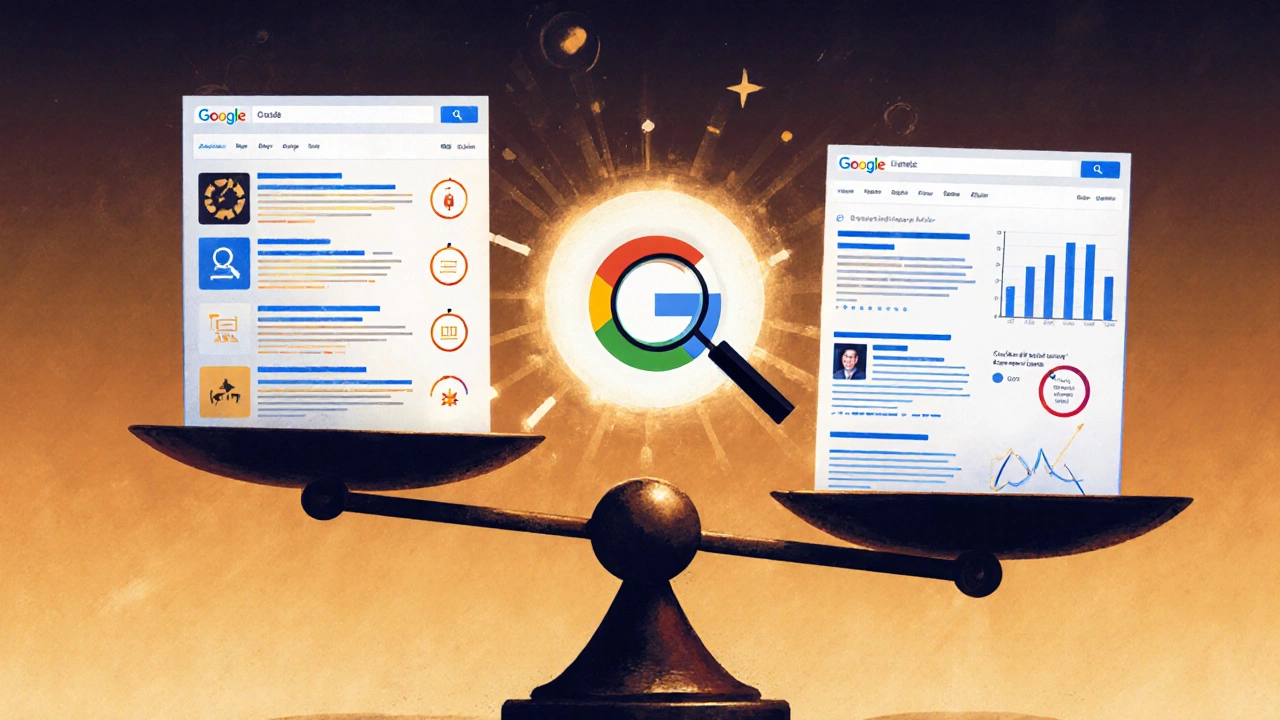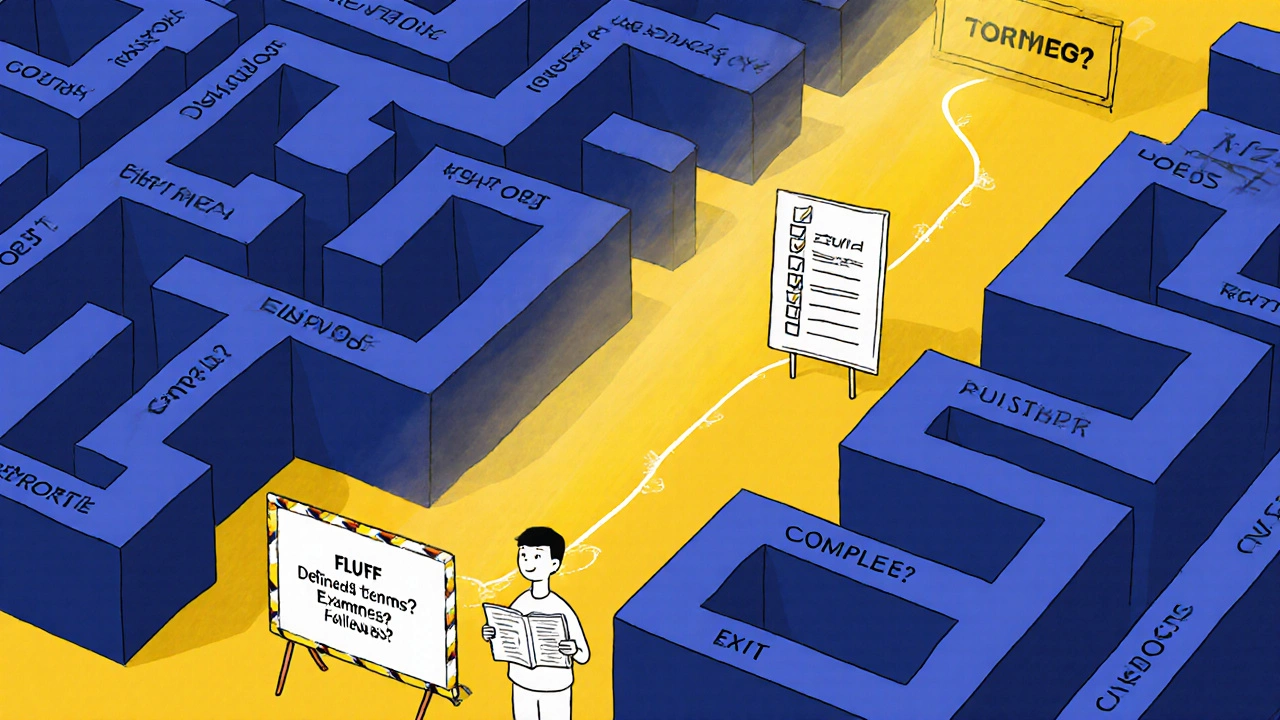SEO Content Length Calculator
Find Your Optimal Content Length
Select your content topic type and learn the ideal word count range to match search intent.
Recommended Length
What to Include
There’s no magic number for the perfect blog post length. You’ve probably heard everything from "500 words is enough" to "you need 2,000 words to rank." But here’s the truth: content length doesn’t rank pages-value does. Length is just a side effect of how much you need to say to fully answer a question.
What Google Actually Wants
Google doesn’t care if your post is 800 words or 3,200. It cares whether your content solves the searcher’s problem better than anything else. If someone types in "how to fix a leaky faucet," a 600-word guide with clear photos and step-by-step instructions will crush a 2,500-word essay that rambles about plumbing history.
But if they search for "best CRM for small businesses in 2025," they’re looking for depth. They want comparisons, pros and cons, pricing breakdowns, integration details, and real user experiences. That kind of query demands more space. A 500-word list won’t cut it.
Back in 2023, Ahrefs analyzed over 1 million Google results and found that the average top-ranking page had 1,447 words. In 2025, that number climbed to 1,762. Why? Because competition got smarter. People aren’t just writing longer posts-they’re writing better ones. They’re answering follow-up questions before the reader even asks them.
How to Find the Right Length for Your Topic
Don’t guess. Look at what’s already ranking. Here’s how:
- Search your target keyword in Google.
- Check the top 3 results. Note their word count (use a tool like WordCounter.net or just highlight and copy into a text editor).
- Ask yourself: "Do they feel complete?" If the top result covers every angle and yours feels thin, you need to add more.
For example, if you’re writing about "how to start a podcast," the top pages are all between 1,800 and 2,400 words. They cover gear, software, hosting platforms, show notes, promotion, and monetization. If your post only talks about microphones, you’re missing the point.
Another trick: look at the "People also ask" section in Google. Each question is a signal. If there are five related questions, you need at least five clear sections in your post. Each section should answer one of those questions thoroughly.
Short Content Can Still Win
Don’t assume longer is always better. Some queries don’t need depth.
- "What time does Walmart open?" → 30 words, answer in a single sentence.
- "How to reset a router?" → 400 words with numbered steps and images.
- "Best coffee beans for espresso" → 1,200 words comparing brands, roast levels, and grinder settings.
Google’s algorithm is smart enough to know when a short answer is enough. In fact, it often rewards concise, accurate answers with Featured Snippets. If you can answer a question clearly in 300 words, don’t pad it with fluff. That just frustrates readers and hurts your bounce rate.

What Happens When You Write Too Much
There’s a downside to going overboard. If you stretch a simple topic into 3,000 words just to hit a "magic number," you risk losing readers.
Think about it: if you’re reading a post about "how to tie a tie," and halfway through it starts talking about the history of neckwear in 18th-century France, you’ll scroll away. No one cares. Google notices that. If people leave quickly, your ranking drops.
Also, longer content takes more time to write, edit, and update. If you’re publishing weekly, you can’t afford to spend 10 hours on every post. Focus on quality over quantity. One well-researched 1,500-word post that gets shared and linked to is worth ten bloated 2,500-word posts that no one reads.
Content Length by Topic Type
Here’s a practical guide based on real ranking data from 2025:
| Topic Type | Average Word Count | Why This Length Works |
|---|---|---|
| How-to guides (simple) | 600-1,000 | Clear steps, minimal background needed |
| Product comparisons | 1,500-2,200 | Needs specs, pricing, pros/cons, real user feedback |
| Beginner tutorials | 1,200-1,800 | Explains terms, includes examples, avoids jargon |
| Industry deep dives | 2,000-3,000+ | Covers trends, data, expert opinions, case studies |
| Listicles (top 10, etc.) | 1,000-1,500 | Each item needs 100-150 words of context |
| FAQ-style answers | 300-700 | Direct, no fluff, answers one question perfectly |
These aren’t rules-they’re benchmarks. Use them to check if you’re under or over-delivering.
It’s Not About Word Count-It’s About Coverage
Instead of counting words, count questions answered. Ask yourself:
- Did I define every term a beginner might not know?
- Did I address the most common objections or mistakes?
- Did I include examples, screenshots, or data?
- Did I link to related topics so readers can keep going?
- Would someone walk away feeling like they now fully understand this?
If the answer is yes, your content length is right-even if it’s 800 words. If the answer is no, no amount of padding will fix it.

What About Backlinks and Shares?
Longer content tends to get more backlinks-not because it’s long, but because it’s more useful. A 2,500-word guide that breaks down 10 different tools with real screenshots and pricing tables is something other bloggers will want to link to. A 600-word list of names? Not so much.
Same goes for social shares. People share content that saves them time or helps them look smart. If your post gives someone a complete answer they can quote or reference, they’ll share it. Length helps only if it adds value.
Update Old Content-Don’t Just Write New
Many bloggers chase new posts. But the real SEO wins come from updating old ones. Check your top-performing posts from the last two years. Are they still accurate? Do they have the latest data? Can you add more depth?
For example, a 1,200-word post from 2023 about "best email marketing tools" might now be missing Mailchimp’s 2025 AI features or ConvertKit’s new automation workflows. Add those. Update pricing. Include new screenshots. Suddenly, your 1,200-word post becomes 2,100-and it climbs back to #1.
Google loves fresh, updated content. Sometimes, expanding an old post is easier-and more effective-than writing a new one from scratch.
Final Rule: Match the Searcher’s Intent
Every search has a hidden goal. Some people want a quick answer. Others want to make a decision. A few want to become experts.
Your job isn’t to hit a word count. It’s to match the depth of the search. If the query feels casual, keep it short. If it feels serious, go deep. Always ask: "What would I need to know if I were this person?" Then give it to them-no more, no less.
Forget the myths. Stop chasing 2,000 words because someone said it’s the "SEO sweet spot." Focus on being the most helpful answer on the page. That’s the only length that matters.
Is 1,000 words enough for SEO?
Yes, if it fully answers the search query. A 1,000-word guide that covers every step, includes examples, and answers common follow-up questions will rank better than a 2,500-word post that’s vague or repetitive. What matters is completeness, not word count.
Does longer content rank better?
Not always. Longer content often ranks better because it tends to cover topics more thoroughly-but only if it adds real value. If you stretch a simple topic to 3,000 words with fluff, Google will notice users leaving quickly and drop your ranking. Depth wins, not length.
What’s the minimum word count for SEO?
There’s no official minimum. Pages as short as 300 words can rank if they perfectly answer a specific question-like "how to turn off iPhone notifications" or "what is a VPN?" But for competitive topics, under 800 words usually means you’re missing key details users expect.
Should I aim for 2,000 words every time?
No. That’s a myth. Only write that much if your topic demands it. A post about "how to clean a coffee maker" doesn’t need 2,000 words. But a post about "how to start a profitable blog in 2025" does. Match the depth to the complexity of the question.
How do I know if my content is too long?
If readers are bouncing quickly, scrolling past sections, or leaving comments like "this is too long" or "just tell me the answer," your content is too long. Use tools like Hotjar or Google Analytics to see scroll depth. If most people leave before the halfway point, cut the fluff.
Does content length affect mobile rankings?
Not directly. But if a long post is poorly formatted-no headings, no images, dense paragraphs-it’ll hurt mobile experience. Google’s mobile-first indexing means readability matters more than word count. Break up long content with subheadings, bullet points, and visuals to keep mobile users engaged.



